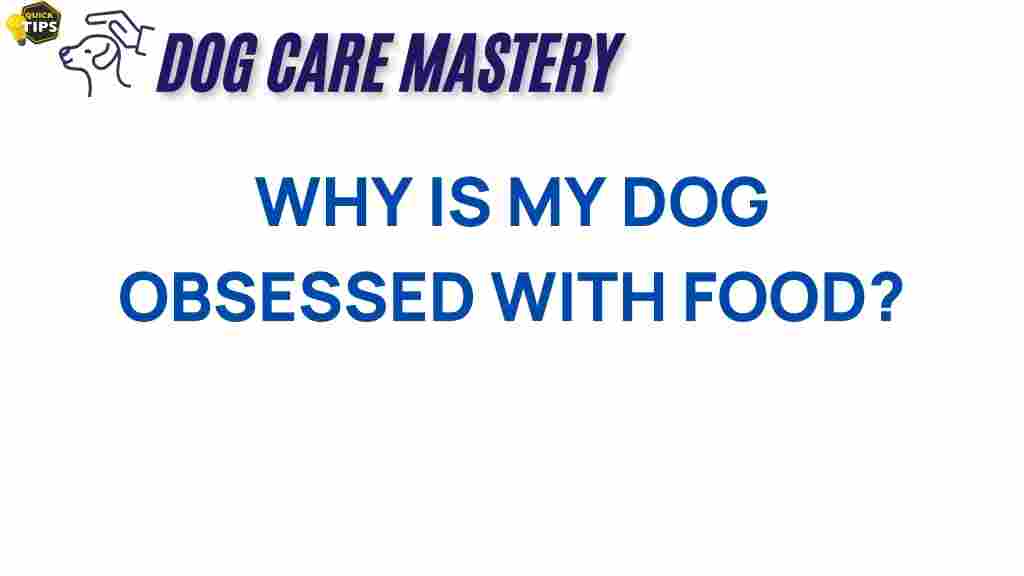Understanding Dog Behavior: Why Is My Dog Obsessed with Food?
Have you ever found yourself bewildered by your dog’s insatiable appetite? You’re not alone! Many dog owners grapple with the question: Why is my dog obsessed with food? Understanding this aspect of dog behavior is essential for both their physical health and your peace of mind. In this article, we will delve into the reasons behind this obsession, explore various facets of dog behavior related to food, and provide practical solutions to help you manage your furry friend’s eating habits.
The Basics of Dog Behavior
To unravel the mystery of a food-obsessed dog, we must first understand some basic principles of dog behavior. Dogs, like humans, have unique personalities and preferences. Some may be more food-driven than others due to a variety of factors, including their breed, age, and environmental influences. Here are a few key points to consider:
- Instincts: Dogs are naturally scavengers. In the wild, their ancestors relied on foraging, which explains why many dogs exhibit a strong desire for food.
- Social Learning: Dogs learn from their environment. If they see other dogs or humans displaying excitement around food, they may mimic that behavior.
- Health Factors: Sometimes, a sudden increase in food obsession can indicate underlying health issues that need to be addressed.
Reasons Your Dog Might Be Obsessed with Food
Now that we’ve established the basics, let’s delve deeper into the specific reasons for your dog’s food obsession:
1. Genetic Predisposition
Some breeds are naturally more predisposed to being food-focused. Breeds like Labrador Retrievers, Beagles, and Cocker Spaniels are notorious for their love of food. Their genetic makeup may make them more likely to obsess over their next meal.
2. Early Experiences
A dog that experienced food scarcity or competition for food during its formative years may develop a strong fixation on food. This behavior can be particularly pronounced in rescue dogs or those from shelters.
3. Boredom or Lack of Stimulation
Dogs need mental and physical stimulation. If they’re not getting enough exercise or engaging activities, they may turn to food as a source of entertainment. This is a common reason behind many behavioral issues.
4. Medical Conditions
Sometimes, an increase in appetite can be a sign of a medical condition such as diabetes, Cushing’s disease, or hyperthyroidism. If your dog’s food obsession is sudden or accompanied by other concerning symptoms, it’s crucial to consult a veterinarian.
5. Reinforcement of Behavior
When you give in to your dog’s begging or food-related antics, you may inadvertently reinforce their behavior. This can lead to a cycle where the dog learns that being food-obsessed gets them what they want.
How to Manage Your Dog’s Food Obsession
Now that we understand the reasons behind your dog’s obsession with food, let’s explore some effective strategies to manage this behavior:
Step 1: Assess Their Diet
Ensure your dog is getting a balanced diet that meets their nutritional needs. Consult with your veterinarian to choose the right food and portion sizes.
Step 2: Establish a Feeding Routine
Set a consistent feeding schedule. Dogs thrive on routine, and knowing when to expect their meals can reduce food-related anxiety. Here’s how to do it:
- Feed your dog at the same times each day.
- Measure out portions to avoid overfeeding.
- Avoid giving table scraps or excessive treats outside of designated meal times.
Step 3: Increase Exercise and Mental Stimulation
Engage your dog in regular exercise and mental challenges to reduce boredom. Activities such as:
- Daily walks or runs
- Interactive toys or puzzles
- Training sessions
These will help channel their energy away from food fixation.
Step 4: Use Positive Reinforcement
Encourage good behavior by rewarding your dog when they ignore food distractions or wait patiently for their meals. Use verbal praise, petting, or healthy treats as rewards.
Step 5: Seek Professional Help
If your dog’s food obsession is severe or causing behavioral issues, consider consulting a professional dog trainer or animal behaviorist. They can provide tailored advice and strategies to help you and your pet.
Troubleshooting Common Issues
As you work on managing your dog’s food obsession, you may encounter some common issues. Here are solutions to address them:
Issue 1: Begging at the Table
Many dogs become persistent beggars during meals. To discourage this behavior:
- Ignore your dog when they beg; don’t give in.
- Provide a designated spot away from the table for them to relax during mealtime.
- Use a crate or separate room if necessary.
Issue 2: Eating Too Quickly
Some dogs gulp their food in a frenzy. To slow them down:
- Consider using a slow feeder bowl.
- Divide their meals into smaller portions.
- Engage them with food puzzles to make mealtime a challenge.
Issue 3: Constantly Searching for Food
If your dog seems to constantly scavenge for food, try the following:
- Ensure their meals are satisfying and nutritious.
- Keep food out of reach and secure trash cans.
- Provide regular play sessions to keep them occupied.
Conclusion
Understanding your dog’s behavior is key to addressing their food obsession. By recognizing the underlying reasons and implementing effective strategies, you can help your dog develop a healthier relationship with food. Remember, patience is essential, and changes may take time. If you’re ever in doubt, don’t hesitate to consult a veterinarian or a professional trainer for personalized advice.
For more information on dog behavior and training tips, check out this helpful resource: Dog Behavior Insights. Understanding your dog is crucial for a happy and healthy life together!
Whether your furry friend is a food lover or just enjoys the occasional treat, being proactive and informed will ensure that you nurture their needs while maintaining a balanced lifestyle. Happy training!
This article is in the category Behavior and created by dogcaremastery Team
